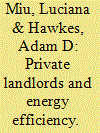| Srl | Item |
| 1 |
ID:
176788


|
|
|
|
|
| Summary/Abstract |
Energy use in British homes is a significant contributor to national greenhouse gas emissions, and the improvement of energy efficiency in residential buildings has long been an important topic in policy discussions. The lack of investment in energy-saving measures is particularly challenging in the private rented sector, and there are significant research and data gaps in understanding the retrofit behaviour of private landlords. In this study, we present the results of a detailed survey on retrofit behaviour of 1069 British private landlords. The survey assesses the engagement of landlords with 18 different energy efficiency measures, as well as their attitudes, perceptions, norms and a number of other characteristics. We use the data collected in the survey to produce 7 behavioural “typologies” of landlord retrofitters, by clustering respondents based on their socio-demographic and business characteristics. In addition to providing descriptive evidence of landlords' retrofit behaviour, our results reveal a number of opportunities for segmenting the landlord population into target groups for future policy interventions. By tailoring retrofit incentives to the needs and motivations of these groups, policy-makers can effectively engage landlords with specific energy-saving technologies, increasing the likelihood of retrofit uptake and accelerating the transition to an energy-efficient private rented sector.
|
|
|
|
|
|
|
|
|
|
|
|
|
|
|
|
| 2 |
ID:
163540


|
|
|
|
|
| Summary/Abstract |
New Zealand's housing is some of the poorest quality and hardest to heat in the developed world. The private rented sector in particular offers the worst quality accommodation to the country's poorest and most vulnerable tenants. Previous research has established a range of economic and socio-cultural explanations for the prevalence of poor conditions in private rented accommodation with the 'principal-agent problem' dominating the debate. This paper reports the findings from research in Dunedin, a city with some of the coldest conditions and least energy efficient properties in the country. The study was undertaken in 2015 and involved 30 in-depth interviews with landlords exploring their attitudes towards improving the thermal performance and energy efficiency of their properties. The results revealed a shift in attitudes amongst landlords over a period of about 5 years, with many becoming more amenable to investing in insulation and low energy heat sources. This shift has ostensibly been driven by pressure from tenants who appear to be departing from established cultural norms and becoming intolerant of cold homes and high bills. The study highlights how socio-cultural factors, such as growing expectations regarding warmth and comfort in the home, can disrupt established cultural norms and economic rationales to bring about change.
|
|
|
|
|
|
|
|
|
|
|
|
|
|
|
|